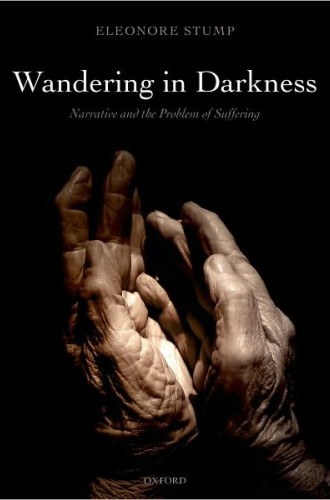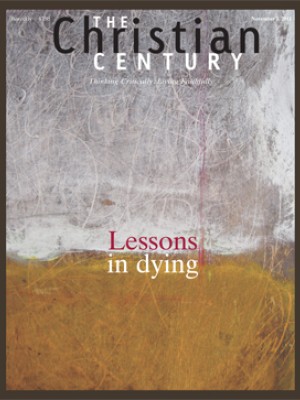Knowledge through suffering
It takes a lifetime, as well as a remarkable life, to write a book like Wandering in Darkness. Eleonore Stump asks: Is it possible in the face of suffering to believe in a God who is omniscient, omnipotent and perfectly morally good? She relentlessly explores this inquiry not only by helping us to see that the question itself must be questioned, but by applying to the query her extraordinary erudition, a gift for philosophical and analytical clarity, and what must be hard-won and profound theological judgments.
This is not a book to give someone who is in the midst of problems that are making that person wonder if God is a good God. Rather, it is written for anyone who may think they would like to write a book for people who are in the midst of a crisis of faith occasioned by suffering. Stump is a well-trained analytical philosopher and is equally well schooled in the thought of Thomas Aquinas. She nicely exhibits adherence to the advice often given to those so trained: when confronted by what seems to be a difficulty that cannot be solved, make a distinction. These distinctions are never ends in themselves, but they help us to think more clearly about how suffering challenges our belief in God.
Read our latest issue or browse back issues.
The heart of Wandering in Darkness is the telling of four stories of suffering from scripture: Job, Samson, Abraham and Mary of Bethany. Stump prepares readers for the significance of these stories by beginning her book with a careful and very interesting argument about why the knowledge we gain from narratives cannot be gained from the analytical philosopher's attempt to restrict what can be known to "knowledge of that." In a characteristic imaginative move she distinguishes between narrative and analytical knowledge, suggesting that the latter knowledge is Dominican and the former is Franciscan.
According to Stump, the Dominicans, who were early forerunners of analytical philosophers, categorize knowledge by sets of abstract properties and designations. Much is gained by such analysis, but if knowledge is restricted to the categories loved by the Dominicans, we can fail to recognize the significance of narratives as crucial for understanding our lives. So we also need the kind of knowing represented by the Franciscans—that is, knowledge that is found in stories, typological knowledge that comes through our interaction with other human beings. Though Stump's Dominican talents are well on display in this book, they are in the service of her Franciscan heart, a heart that has its reasons.
In her instructive account of the kind of knowledge that is gained through narratives, Stump introduces a distinction between first-, second- and third-person perspectives that is crucial for the way she develops the stories of Job, Samson, Abraham and Mary. Second-person knowledge is fundamentally different from first-person knowledge of ourselves or third-person knowledge of another because second-person knowledge of another requires personal interaction of a direct and immediate sort. Accordingly, second-person knowledge is paradigmatically Franciscan, and stories are second-person accounts.
Stump's introduction of second-person knowledge makes necessary one other development before she begins her discussion of biblical stories. In part two of the book she develops an account of love and loneliness that characterizes our second-person experiences. We are creatures created to desire the love of God and one another. Such love wants not only good for, but also union with, the beloved. Our very ability to be an integrated human person depends on our ability to be loved and to love. When we will evil in the name of good, we become divided against ourselves and suffer "a kind of willed loneliness" in which we are alienated from God and other creatures.
Stump then tells the biblical stories, each with its distinctive character, as stories fundamentally of the loss of love and its restoration through suffering. I have no doubt that her reading will be controversial. She contends that the suffering of each of these figures finally has purpose because it puts each in a more determinative relation to God. The way she tells these stories means that she must often argue against critical reconstruction of these texts in favor of the way they have been read in the past. For example, she reads the beginning and end of Job as integral to the poetry, arguing that God refuses to give up even on the possibility that the devil—that is, the one who is so fragmented he is incapable of love—might be saved.
In a like manner she suggests that Abraham rightly followed God's command to sacrifice Isaac because of his faith—his trust in the God who had promised that he would be the father of a people. Stump's reading of these stories does not deny that suffering is real. In particular, her reading of Hagar and Ishmael is profound. She knows that their suffering cannot be explained away, but she also refuses to let it be the last word. She argues that their suffering is not pointless when we read from a second-person perspective, in which nothing is more significant than the desire to be in love with God.
I confess that I was not predisposed to agree with Stump's exegesis (if that is the right word for her approach to these texts), but I found her retelling of the stories of Job, Sampson (whose suffering was deserved) and Abraham very persuasive. I did not find her argument that Mary of Bethany felt betrayed by Jesus' delay before coming to heal Lazarus nearly as convincing. But her account of the shame that may have characterized Mary's life, that this Mary was a person others found to be defiled, is powerful whether it is true of her or not. In particular, Stump's suggestion that the love of Jesus glorifies such lives is not only profound but deeply moving.
Stump ends her book with an extended explication of Aquinas's understanding of theodicy. It will come as no surprise to anyone who has followed her argument to this point that Aquinas's account is quite similar to her earlier understanding of love and loneliness, which she develops to shape her retelling of the biblical stories. The stories remain crucial not as examples of more determinative philosophical arguments but as accounts of our lives that make Aquinas's philosophical analysis intelligible. Accordingly, Stump's account of Aquinas is not an add-on but a fitting climax to a book that contends that nothing worse can happen to us than that we become permanently alienated from ourselves and others, so that it becomes impossible for us to realize that our greatest good as human beings is to be in union with God through love.
Though she characterizes Aquinas's account as his theodicy, she denies that her own position is best described by this term. Rather she characterizes her argument as a defense. According to Stump, a theodicy entails an attempt to defend the consistency of religious belief with uncontested empirical evidence to show that it is not inconsistent for God to allow the kinds of suffering the biblical stories turn on. A defense attempts only to tell a story about God and human suffering that is enough like our actual world that the story could be true as told.
Though I have doubted the usefulness of the enterprise of theodicy and though I remain convinced that certain explanations of evil are evil, Stump's defense has convinced me that through suffering, God would draw us closer to love.






